by DAVID ROLINSON
Play for Today Writer: Colin Welland; Producer: Kenith Trodd; Director: Roy Battersby
This essay continues from Part 2 and Part 1.
The debate
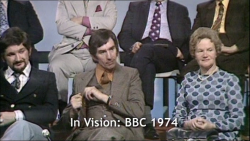
Producer Kenith Trodd faced criticism and praise from local workers, employers and critics in an edition of the discussion programme series In Vision (1974-75) that was dedicated to Leeds – United!1 The play had a largely female cast who were positioned as participants: its lead actors and its extras were social actors, as mass crowds reconstructed their real-life participation in the 1970 events. The guests on In Vision include women workers who respond to the techniques by which their experiences were depicted by that male-authored text. There is a revealing tension between the play and the discussion programme. Women are addressed variously as subjects, participants and audiences, and this problematic movement is one with which the women workers are partly complicit, as we shall see. Women are the minority – 3 out of 10 guests – and are addressed in part as audience members, albeit in order to comment on the textual representation of their social participation. The programme opens up gendered discourse relating to the workplace and drama, or even contributes to that discourse. Of course, In Vision is a different type of text, with its own codes and conventions as well as its own guidelines on issues such as balance.
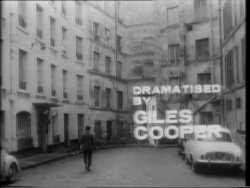 Giles Cooper is widely recognised as having been Britain’s greatest radio dramatist. He was highly prolific, writing dozens of original plays and adaptations for radio across a period of around 13 years. He was responsible for many of the medium’s masterpieces during the 1950s and his accomplishments were acknowledged posthumously with the BBC’s radio playwriting award being named in his honour. He also wrote for the stage, having particular success with his 1962 play Everything in the Garden, a dark comedy of middle-class suburban hypocrisy and greed.
Giles Cooper is widely recognised as having been Britain’s greatest radio dramatist. He was highly prolific, writing dozens of original plays and adaptations for radio across a period of around 13 years. He was responsible for many of the medium’s masterpieces during the 1950s and his accomplishments were acknowledged posthumously with the BBC’s radio playwriting award being named in his honour. He also wrote for the stage, having particular success with his 1962 play Everything in the Garden, a dark comedy of middle-class suburban hypocrisy and greed. 

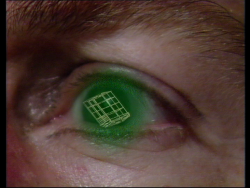
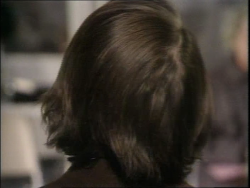
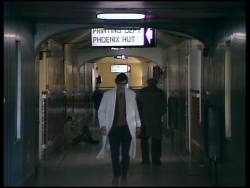 Funny Farm depicts a night shift by nurse Alan Welbeck (Tim Preece) on a psychiatric ward. As reviewer James Scott put it, the play comments on “conditions in our mental hospitals – understaffing, overwork, bad pay, old inadequate buildings” and unsatisfactory “patient treatment and cure”, points which are heightened by the play’s “understatement” and rejection of “sensationalism and sentimentality”.
Funny Farm depicts a night shift by nurse Alan Welbeck (Tim Preece) on a psychiatric ward. As reviewer James Scott put it, the play comments on “conditions in our mental hospitals – understaffing, overwork, bad pay, old inadequate buildings” and unsatisfactory “patient treatment and cure”, points which are heightened by the play’s “understatement” and rejection of “sensationalism and sentimentality”.